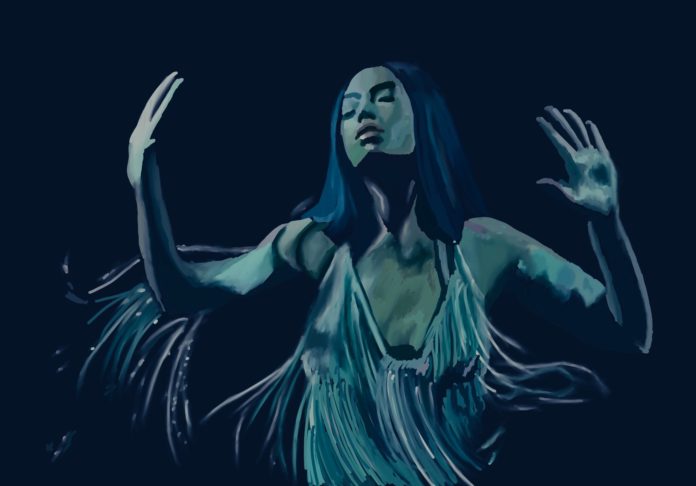The opening shot of “When I Get Home,” Solange Knowles’ new 33-minute-long music video, shows her reveling in an ecstasy that is never truly reached on its accompanying record. After a successful career reboot in 2016, the popular R&B artist shed her skin as an infrequent backup dancer for Destiny’s Child and a no-hit wonder. Her critically acclaimed album “A Seat at The Table” arrived at an opportune time as it followed an album and pseudo-political film release from Beyoncé, her well-known older sister. Solange’s comeback predated Childish Gambino’s insipid Prince imitation, “Redbone,” by just two months, and all three of these records gained cultural and critical relevance as the year wound down. This didn’t signal a shift, but it did make a statement about the way contemporary R&B could be smoothly adapted into a pop music ecosystem struggling to find genuine and original pop stars. Artists like Moses Sumney, Kelela and Kilo Kish began bubbling just below the mainstream while appearing as cultural cachet in fashion shows and art museums. A critical listener can parse a handful of good songs from this pack, but consider an even more vogue R&B hipster like Dev Hynes, who is as stylistically close to Solange as any, and together their cosmopolitan ethos liquifies ‘soul’ and replaces it with tidy, yet hollow aesthetics.
Critics at Pitchfork, Fader and The Atlantic unanimously praised “When I Get Home“ while the New York Times said it “Defies Pop Expectations.” Since 2016, Solanage has been celebrated for her Afrocentric style, but a real inspection is tasked with identifying if this is her only means of connecting with an audience. If “When I Get Home“ defies pop expectations, where was this fervor back in 2016 for Kilo Kish’s superior yet similar album “Reflections In Real Time“? “When I Get Home” is being praised for its short songs and minimalist design, but Kilo Kish accomplished that same feat while squeezing in clever maxims of social satire. Kish sings, “We’re all carbon copies with different hobbies,” signaling that on some level humanity is grounded in a collective nature but our expressed interests validate our differences. Contrast this with the track “We Deal With the Freak’n (intermission),” where Solange finishes her verse with the mouthful of a line, “We are the walking embodiment of god consciousness.” In press-related interviews, Solange said she got her musical inspiration for this album from the late Alice Coltrane. She should have said fellow Texas R&B artist Erykah Badu, because at least then a sonic relation would be in play. The psychedelic sensation of Coltrane and the insightful pop-mysticism of Badu are simply window dressings for a spirituality that is condensed in this fluffy affirmation. Solange evokes these styles without freshly updating any of them. Her songs don’t linger, they evaporate into a vibe, which is a trendy way of saying into a passionless atmosphere.
Badu’s 2007 record, “Master Teacher,” coined the timeworn term “stay woke” and instilled a philosophy while Solange simply repeats the word “black” as a gesture on the Pharrell-produced track Almeida. This watercolor R&B is the furthest thing from radical. It is passive and packaged, too afraid to get its hands dirty and wring out the passion or soul from its predecessors. The press can make excuses under the guise that obscurity is a virtue, but on this album, the only way Solange’s vocal performance expresses a thought is by repeating it to the point of dizzying distortion. On the track “Stay Flo,” she erupts into chants and flutters of celebratory “ayes,” but they don’t feel earned because it doesn’t carry a euphoric effect without the slightest sense of build up. At least it symbolizes the album’s result of congratulating audiences based on what they already know and believe. If meditating on Solange’s phrase “do nothing without intention” inspires listeners, then fine, but the genre needs a balance of sensual wit and flair like Tamia’s 2018 single “Leave It Smoking.” Solange’s monochromatic image fits the mold of a contemporary R&B star, but is that enough to vault her into a canon of politically and aesthetically astute singers?
Solange co-directed the music video for “When I Get Home,” and its visuals play on her Houston fantasy. Filmmaker Terrence Nance assisted with production and the film’s scattershot tone echoes his work on “An Oversimplification of Beauty.” Solange breezes through outfit changes while cowboys ride through the desert and around a parking lot. Hometown legends Scarface and Devin The Dude are credited on the album albeit in minor roles. This locality is charming, but it doesn’t offer a strong cinematic moment in which the viewer learns something about Solange other than her polished fashion tastes. She appears to be here to stay, and while her aesthetic aspirations are high, I wonder when she might make an album to be felt and not just admired.
![]()






























